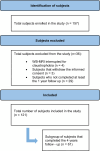Observations Regarding the Detection of Abnormal Findings Following a Cancer Screening Whole-Body MRI in Asymptomatic Subjects: The Psychological Consequences and the Role of Personality Traits Over Time
- PMID: 38821883
- PMCID: PMC11706315
- DOI: 10.1002/jmri.29461
Observations Regarding the Detection of Abnormal Findings Following a Cancer Screening Whole-Body MRI in Asymptomatic Subjects: The Psychological Consequences and the Role of Personality Traits Over Time
Abstract
Background: The use of whole-body MRI (WB-MRI) in oncology has uncovered frequent unexpected abnormal findings (AFs). However, the impact of AFs on the patients' mental well-being is still poorly examined.
Purpose: To investigate the long-term psychological consequences of AF detection following WB-MRI for cancer screening in asymptomatic individuals.
Study type: Prospective, longitudinal.
Population: 121 consecutive subjects of the general population (mean age = 52.61 ± 11.39 years; 63% males) scheduled for cancer screening by WB-MRI.
Field strength/sequence: 1.5-T and 3-T; protocol complied with Oncologically Relevant Findings Reporting and Data System (ONCO-RADS) guidelines.
Assessment: Participants completed the first psychological investigation (T0) immediately after the WB-MRI. Subsequently, it was repeated after 1-year (T1), and 4-years (T2, subgroup of 61 participants) without an MRI exam, assessing personality traits, tumor risk perception, quality of life, depressive, and anxious symptoms. Radiologists directly reported WB-MRI findings to the participants, explaining the clinical implications and the location of the AFs. The number and severity of AFs were assessed.
Statistical tests: Pearson's correlations and analysis of variance with repeated measures assessed the psychological health variables' relationship and their changes over time. A P-value <0.05 was considered statistically significant.
Results: All participants presented AFs, with 101 individuals categorized as ONCO-RADS 2 and 19 as ONCO-RADS 3. The AFs were most prevalent in bones (31.5%). The overall participants showed only a slight increase in depressive symptoms at T1 [F(1,112) = 7.54]. The severity and the number of AFs were not significantly related to psychological changes [ranging from P = 0.503 to P = 0.997]. Depressive and anxious symptoms over time were significantly affected by the traits of conscientiousness [T1: F(1,112) = 7.87; T2: F(1.708,90.544) = 3.40] and openness [T1: F(1,112) = 4.41].
Data conclusion: Disclosing AFs by WB-MRI exams for cancer screening may not lead to long-term psychosocial consequences. Certain personality traits may, however, influence the psychological distress experienced by individuals with AFs after WB-MRI exams.
Technical efficacy: Stage 5.
Keywords: abnormal findings; cancer screening; psychological consequences; psychosocial health; whole‐body MRI.
© 2024 The Author(s). Journal of Magnetic Resonance Imaging published by Wiley Periodicals LLC on behalf of International Society for Magnetic Resonance in Medicine.
Figures
Similar articles
-
Applying ONCO-RADS to whole-body MRI cancer screening in a retrospective cohort of asymptomatic individuals.Cancer Imaging. 2024 Feb 7;24(1):22. doi: 10.1186/s40644-024-00665-z. Cancer Imaging. 2024. PMID: 38326850 Free PMC article.
-
Whole-body magnetic resonance imaging (WB-MRI) for cancer screening in asymptomatic subjects of the general population: review and recommendations.Cancer Imaging. 2020 May 11;20(1):34. doi: 10.1186/s40644-020-00315-0. Cancer Imaging. 2020. PMID: 32393345 Free PMC article. Review.
-
Feasibility of whole-body MRI for cancer screening in children and young people with ataxia telangiectasia: A mixed methods cross-sectional study.Cancer Med. 2024 Jul;13(14):e70049. doi: 10.1002/cam4.70049. Cancer Med. 2024. PMID: 39056567 Free PMC article.
-
Oncologically Relevant Findings Reporting and Data System (ONCO-RADS): Guidelines for the Acquisition, Interpretation, and Reporting of Whole-Body MRI for Cancer Screening.Radiology. 2021 Jun;299(3):494-507. doi: 10.1148/radiol.2021201740. Epub 2021 Apr 27. Radiology. 2021. PMID: 33904776 Review.
-
Health outcomes and experiences of direct-to-consumer high-intensity screening using both whole-body magnetic resonance imaging and cardiological examination.PLoS One. 2020 Nov 20;15(11):e0242066. doi: 10.1371/journal.pone.0242066. eCollection 2020. PLoS One. 2020. PMID: 33216779 Free PMC article.
Cited by
-
The Whole-Body MRI Reporting and Data System Guidelines for Prostate Cancer (MET-RADS-P), Multiple Myeloma (MY-RADS), and Cancer Screening (ONCO-RADS).Cancers (Basel). 2025 Jan 16;17(2):275. doi: 10.3390/cancers17020275. Cancers (Basel). 2025. PMID: 39858056 Free PMC article. Review.
References
-
- Li B, Li Q, Nie W, Liu S. Diagnostic value of whole‐body diffusion‐weighted magnetic resonance imaging for detection of primary and metastatic malignancies: A meta‐analysis. Eur J Radiol 2014;83:338‐344. - PubMed
-
- Ahlawat S, Debs P, Amini B, Lecouvet FE, Omoumi P, Wessell DE. Clinical applications and controversies of whole‐body MRI: AJR expert panel narrative review. Am J Roentgenol 2023;220:463‐475. - PubMed
-
- Morone M, Bali MA, Tunariu N, et al. Whole‐body MRI: Current applications in oncology. Am J Roentgenol 2017;209:W336‐W349. - PubMed
-
- Crosby D, Bhatia S, Brindle KM, et al. Early detection of cancer. Science 2022;375:eaay9040. - PubMed


